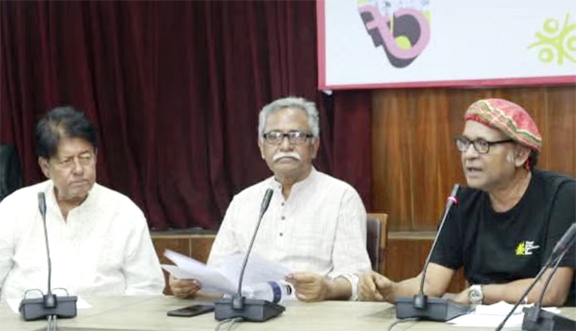DE Online Desk:
Cultural activists on Friday called on the government to allocate one percent of the national budget for the 2025–26 fiscal year to the cultural sector, emphasizing the need for sustained investment in the country’s artistic and heritage development.
The demand was raised at a seminar titled “Budget Analysis and Proposal for the Cultural Sector”, organized by the Theatre Artists Association of Dhaka (TAAD), held at the Seminar Room of the National Theatre Hall at Bangladesh Shilpakala Academy.
Eminent economist Professor Anu Muhammad attended the event as the chief guest.
Other prominent speakers included noted dance artist and researcher Lubna Marium, veteran theatre personalities Mamunur Rashid and Tariq Anam Khan, Nazrul Sangeet exponent and trainer Sujit Mustafa, recitation artist Golam Sarowar, photographer and Drishokal editor K M Jahangir Alam, and Mohammad Abu Yusuf, director of the Centre on Budget and Policy at Dhaka University.
The seminar was presided over by TAAD president Azad Abul Kalam.
TAAD member Kazi Toufiqul Islam Emon presented the concept paper, while Apu Shahid moderated the session.
During the seminar, TAAD outlined several proposals, including the establishment of a digital cultural archive, creation of autonomous cultural institutions, allocation within the revenue budget for cultural activities, establishment of folk and minority cultural institutes, decentralization and strengthening of the branches of Bangladesh Shilpakala Academy and other government cultural bodies, increased artist donations, district-level learning centers, and the setting up of cultural centers abroad.
Professor Anu Muhammad underscored the broader significance of budgetary allocations, stating, “The national budget is not merely an economic document—it reflects a nation’s aspirations.”
He further stressed the need for stronger integration between the Ministry of Culture and the Ministry of Education, and encouraged continued advocacy from cultural activists to protect both cultural heritage and the environment.
Lubna Marium emphasized the importance of data-driven development, stating, “We must collect and research cultural data to develop a sustainable cultural policy.”
Sujit Mustafa urged state broadcasters to revise artist and trainer remuneration in alignment with global standards, while Tariq Anam Khan called for proactive government policies to nurture rather than neglect cultural growth.
Mamunur Rashid controversially suggested that a Ministry of Culture might be counterproductive, claiming it often hinders rather than supports cultural practice.
Dhaka University’s Mohammad Abu Yusuf noted that while government investment exists in the cultural sector, a more forward-thinking approach is essential to foster a truly creative society.

